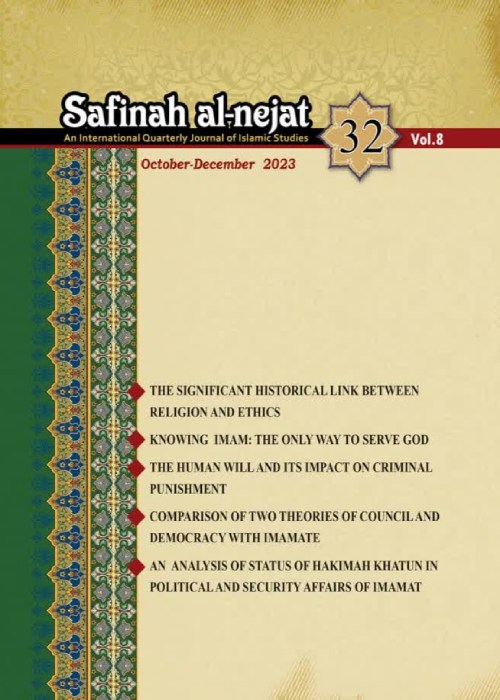فهرست مطالب

Safinah al-nejat
Volume:8 Issue: 32, Autumn 2023
- تاریخ انتشار: 1402/09/10
- تعداد عناوین: 6
-
Pages 5-6
-
Pages 7-30
The relationship between ethics and religion, especially after the secularization of western societies and social de-religiousization, has been the subject of many studies. This connection can be examined from the aspects such as semantic, cognitive existence, historical, etc. The appearance of it is the principle of the historical relationship between religion and ethics is generally agreed upon by philosophers and thinkers. At the same time, the nature of this connection is the subject of questioning and investigation by some thinkers. Some contemporaries, while accepting the principle of historical connection between religion and ethics, have rejected the logical connection between the two, and from this point of view, morality is independent of religion and not based on religious foundations. Abolghasem Fanaei in his book "din dar tarazoye tarikh" (Religion inthe scale of ethics), while accepting the deep historical connection between religion and ethics, claims that this connection is not a logical connection and cannot be the reason for the stability of ethics on religious foundations. In the way of proving his claim, he criticized the views of two moral philosophers, Anscombe and McIntyre. In this essay, we have tried to criticize his claims regarding the historical relationship between ethics and religion. The method is critical, historical and analytical. In this article, we have shown that Abolghasem Fanaei's understanding of the views of moral philosophers is not a complete understanding, and his criticisms of Anscombe and McIntyre's views are not valid. Therefore, the author's claim on the independence of morality from religion in the historical approach remains unfounded. Also, by stating the historical evidence, it is clarified that the historical connection between ethics and religion is much deeper than what the author believes, and it is stated that the discovery of a logical connection from the historical connection is not a reasonable expectation; Because each of them is independently the subject of scientific discussion.
Keywords: the relationship between ethics, religion, Fanaei, Abolghasem-critisize religion, Religion inthe scale of ethics (book) – book review, Anscombe, McIntyre, Western Philosophy -
Pages 31-46
God has shown the way of His service to humans. The way of serving God, if it is supposed to be accepted by His holy essence, must be presented from His Own Side. We can rationally understand that we should serve God, our Lord, but the same reason dictates that we should take it from God Himself; Especially since we know that God has not left us on our own to worship Him however we want, but He has sent messengers on His behalf to teach us the ritual of His worship, and by this means He has completed His proof for us. Therefore, we cannot worship Him however we want.
Keywords: religion, knowing Imam, serving God -
Pages 47-60
The issue of will and free will has far-reaching effects and consequences in various sciences. In the field of law and jurisprudence howthe will is formed and actualized is effective in the accuracy of contracts and convictionsas well as the extent of punishment. According to Aristotle, the foundation of ethics and law rests upon will and free will. In the view of Aristotle, will is a volitional act that is uncoercive, and is based on knowledge and understanding, and actions that emerge out of coercion or ignorance are deemed ascompulsive acts.Aristotle considers compulsive acts to be pardonable under certain circumstances.
Keywords: human development, criminal punishment -
Pages 61-107
The position of Imamate is a divine and heavenly position, the truth of which cannot be understood by any human being, and no one is able to understand it. This is while some people have doubts in their minds due to the lack of correct understanding of Imamate in Shiite thought. The origin of that doubt is, on the one hand, the lack of reflection and precision in the verses and traditions, and on the other hand, the comparison of this divine authority with human authorities and systems. One of these doubts is the role of democracy and council in determining the imam, which the supporters of these two theories by making confusion in the meaning of imamate and government and the homogenization of the meaning of the two - as these two have been a manifestation of the involvement and participation and influence of individuals on the political power - has ruled that the imamate and democracy are incompatible. The writer in this article is to first analyze democracy and council separately in two parts and describe its types and documents and then criticize and challenge these two theories by analyzing them.
Keywords: imamate, government, council, democracy, appointment of imam -
Pages 108-132
The significant role of relatives of holy imams can not be denied in the process of flourishing Islam. In the present article the status and attempts of Hakimah Khatun in this way are studied.
Keywords: Hakimah Khatun, Imam Hasan ‘Askari, Imam Mahdi

